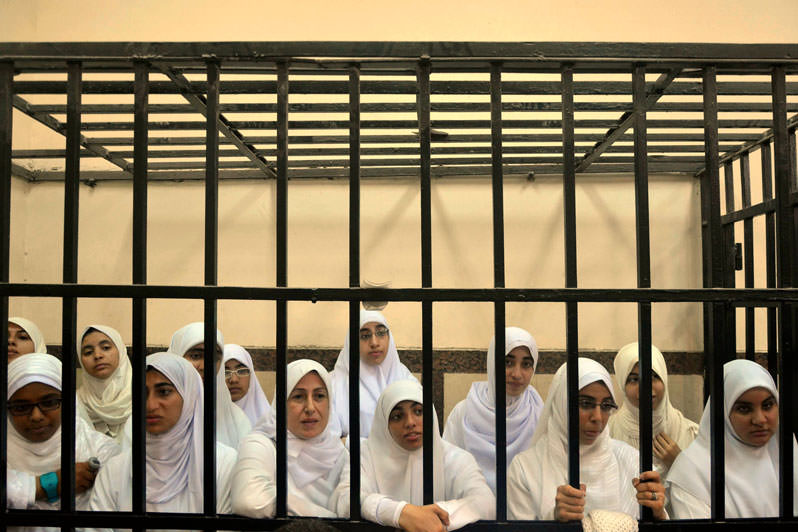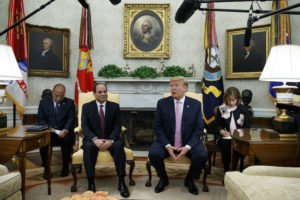Women in Egypt After the Arab Spring: Gains and Losses
Women played a significant role in the 2011-2013 revolutions that shook the heart of the Arab world, as well as in the succeeding turmoil. Female supporters of ousted President Mohammed Morsi stand inside the defendants' cage in a courtroom in Alexandria, Egypt, in 2013. An Egyptian court handed down heavy sentences of 11 years in prison to 21 female supporters of the ousted Islamist president, many of them juveniles, for holding a protest. AP /Amira Mortada, El Shorouk Newspaper
Female supporters of ousted President Mohammed Morsi stand inside the defendants' cage in a courtroom in Alexandria, Egypt, in 2013. An Egyptian court handed down heavy sentences of 11 years in prison to 21 female supporters of the ousted Islamist president, many of them juveniles, for holding a protest. AP /Amira Mortada, El Shorouk Newspaper
By Juan Cole and Shahin Malik Cole
The welcome news last month that Egyptian activist Mahienour El-Massry was released early from prison is an occasion to consider what the political upheavals in Egypt since 2011 have meant for women’s issues. She was set free after her sentence for unlicensed protest was suspended by the courts. A hero of the 2011 overthrow of dictator Hosni Mubarak and a leader of the Revolutionary Socialists youth group, she and the young female activists of her generation are clearly still feared by the military-backed government of President Abdel-Fattah el-Sissi.
Women played a significant role in the 2011-2013 revolutions that shook the heart of the Arab world, as well as in the succeeding turmoil. About a fifth of the young demonstrators at Tahrir Square in Cairo who brought down Mubarak were women. The concerns of women, from their place in new constitutions to the ways police targeted female demonstrators for humiliation (as with the notorious “blue bra” assault in Egypt) have been a big part of the new Arab youth movements.
The Egyptian government under the now-deposed Mubarak (in office 1981-2011) adopted a program of “state-sponsored feminism.” Elderly men and the fashionable first lady, Suzanne Mubarak, spoke for women. Their interests, however, were distant from those of most poor women, and from those of a new, activist generation.
The overthrow of Mubarak gave young Egyptian women the opportunity to escape the manacles of state feminism and to think for themselves about the position of women. Young women, often excluded from the meatspace public sphere by norms of gender segregation, deployed the Internet and social media to make their concerns known and even to exercise leadership in the youth movements.
In March 2011, soon after the old regime fell, women staged a small demonstration on International Women’s Day, but met hostility from young men who shouted at them to go home and get busy in the kitchen. Although many young men who participated in demonstrations were supportive of female colleagues, a strong sense of patriarchy and entitlement characterized others. At the same time, el-Sissi, now the country’s president, ordered young women who stayed overnight in tents at Tahrir Square arrested and subjected to “virginity tests” as a way of intimidating the protesters. Continual online condemnation of this practice and further demonstrations ultimately made el-Sissi back off.
On Dec. 18, 2011, youth came out to demand that the generals, who had succeeded Mubarak, go back to their barracks. Egyptian security forces responded brutally, and activists caught on video the beating of a female protester, in which her outer robes were torn off, exposing her blue bra, and she was viciously stomped on with army boots. The following Tuesday, thousands of women came into the streets condemning the attack, in perhaps the biggest women’s demonstration in modern Egyptian history, and the army was forced to apologize.
Women in Egypt were deeply divided over the election in June 2012 of Muslim Brotherhood leader Mohammed Morsi as president. He stacked his cabinet with fundamentalists, pushed through a theocratically tinged constitution, and tried to pass laws rooted in literalist interpretations of the Muslim legal heritage. Female members of the constituent assembly charged with writing the constitution resigned en masse in October 2012 in protest of the chauvinism of the Brotherhood majority on that body. In March 2013 the United Nations issued a condemnation of violence against women, to which the Egyptian Muslim Brotherhood responded testily, saying that it was “un-Islamic” and would lead to the “disintegration of society.”
Women, unsurprisingly, played a major role in the grass-roots Rebellion (Tamarrud) Movement of spring-summer 2013, which demanded that Morsi subject himself to a recall election. The millions of people in the streets, including young women, on June 30 paved the way for Morsi’s overthrow by the military a few days later. The military government led by then-Field Marshal el-Sissi harshly repressed the Muslim Brotherhood, declaring its members “terrorists.” Military and police assaults on Brotherhood sit-ins left hundreds dead.
The military-backed regime produced a new constitution in January, which was voted in by national referendum. The youth did not for the most part participate in this referendum, upset that the constitution was crafted by an appointed elite. The document is generally good on issues related to women and children, but we are back to the days of state-sponsored feminism.
Although women’s rights have improved on paper, the issues of sexual harassment and rape, always rampant in Egypt, became even more pressing this past year. In early June, the outgoing interim government criminalized sexual harassment, and el-Sissi pledged to address the issue forthrightly. Over the summer, for the first time, a man was sentenced to a year in prison for taking cellphone pictures of a woman asleep on a bus.
Most of the activist youth who had spearheaded the 2011 and 2013 revolutions did not bother to vote in the presidential election held in late May. Many youth activists are in prison, after the government criminalized unlicensed protest. Although middle-aged women are said to be among el-Sissi’s biggest boosters, hoping he will restore order and bring prosperity, clearly neither younger women nor men feel represented in the new order, wherein Egypt’s old economic elites have reasserted themselves.
The millennial generation of Egyptian women will nevertheless continue to blaze their own trail in reimagining gender relations, as the online campaign to free Mahienour El-Massry demonstrates. El-Sissi’s state-sponsored “feminism” is a dead end.
Juan Cole is director of the Center for Middle Eastern and North African Studies at the University of Michigan and author of “The New Arabs: How the Millennial Generation Is Changing the Middle East.” Shahin Malik Cole practiced law in Pakistan and now lives in Ann Arbor, Mich.
Your support matters…Independent journalism is under threat and overshadowed by heavily funded mainstream media.
You can help level the playing field. Become a member.
Your tax-deductible contribution keeps us digging beneath the headlines to give you thought-provoking, investigative reporting and analysis that unearths what's really happening- without compromise.
Give today to support our courageous, independent journalists.



You need to be a supporter to comment.
There are currently no responses to this article.
Be the first to respond.